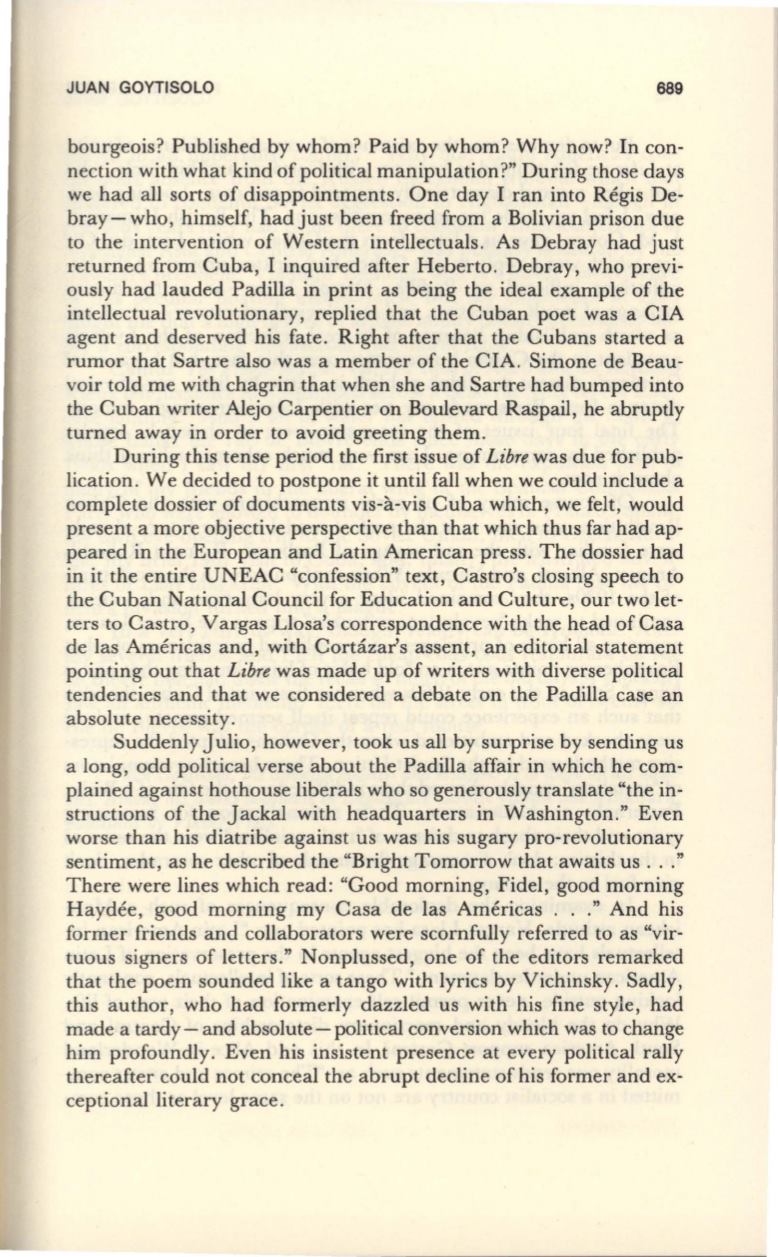
JUAN GOYTISOLO
689
bourgeois? Published by whom? Paid by whom? Why now? In con–
nection with what kind of political manipulation?" During those days
we had all sorts of disappointments. One day I ran into Regis De–
bray- who , himself, had just been freed from a Bolivian prison due
to the intervention of Western intellectuals. As Debray had just
returned from Cuba, I inquired after Heberto. Debray, who previ–
ously had lauded Padilla in print as being the ideal example of the
intellectual revolutionary, replied that the Cuban poet was a CIA
agent and deserved his fate. Right after that the Cubans started a
rumor that Sartre also was a member of the CIA. Simone de Beau–
voir told me with chagrin that when she and Sartre had bumped into
the Cuban writer Alejo Carpentier on Boulevard Raspail, he abruptly
turned away in order to avoid greeting them.
During this tense period the first issue of
Libre
was due for pub–
lication. We decided to postpone it until fall when we could include a
complete dossier of documents vis-a-vis Cuba which, we felt, would
present a more objective perspective than that which thus far had ap–
peared in the European and Latin American press. The dossier had
in it the entire UNEAC "confession" text, Castro's closing speech to
the Cuban National Council for Education and Culture, our two let–
ters to Castro, Vargas Llosa's correspondence with the head of Casa
de las Americas and, with Cortazar's assent, an editorial statement
pointing out that
Libre
was made up of writers with diverse political
tendencies and that we considered a debate on the Padilla case an
absolute necessity.
Suddenly Julio, however, took us all by surprise by sending us
a long, odd political verse about the Padilla affair in which he com–
plained against hothouse liberals who so generously translate "the in–
structions of the Jackal with headquarters in Washington ." Even
worse than his diatribe against us was his sugary pro-revolutionary
sentiment, as he described the "Bright Tomorrow that awaits us ..."
There were lines which read : "Good morning, Fidel, good morning
Haydee , good morning my Casa de las Americas ..." And his
former friends and collaborators were scornfully referred to as "vir–
tuous signers of letters ." Nonplussed, one of the editors remarked
that the poem sounded like a tango with lyrics by Vichinsky. Sadly,
this author, who had formerly dazzled us with his fine style, had
made a tardy- and absolute- political conversion which was to change
him profoundly. Even his insistent presence at every political rally
thereafter could not conceal the abrupt decline of his former and ex–
ceptional literary grace.


